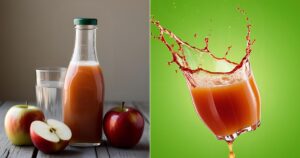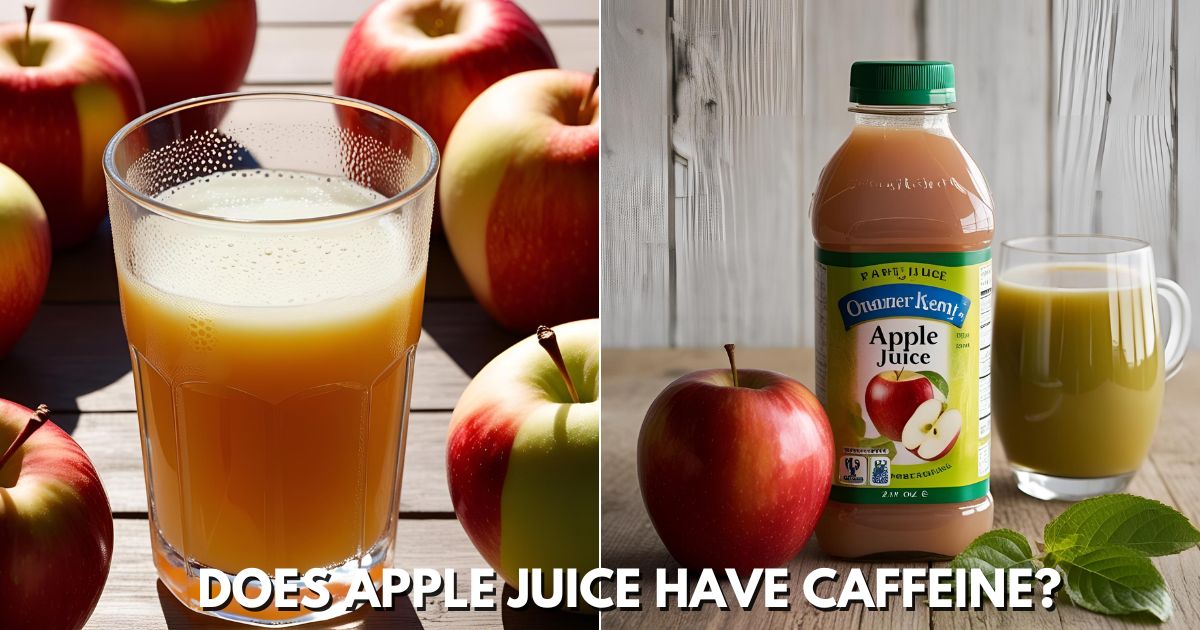Last updated on July 25th, 2025 at 02:02 am
Does apple juice have caffeine?
No — apple juice contains 0 mg of caffeine, making it a safe and energizing option for kids, adults, and anyone cutting back on stimulants.
But here’s the twist — many people still feel a boost after drinking it. Why?
The answer lies in its natural sugars, vitamins, and how your body processes them.
In this guide, you’ll discover the surprising science behind apple juice’s energy effects, its full nutritional profile, and whether common myths hold up.
Let’s bust the confusion — and get to the facts.
Does Apple Juice Contain Caffeine? (Zero mg Explained via Research)
Let’s get right to it: apple juice contains 0 mg of caffeine.
That’s not an estimate — it’s a verified fact.
Backed by Research:
USDA FoodData Central and Nutritionix both list “Caffeine: 0 mg” per 8 oz of apple juice.
Snapple, Minute Maid, and Starbucks clearly label their apple juice products as caffeine-free.
Even the Wikipedia page on caffeine confirms it’s found only in tea leaves, coffee beans, and cacao — not in fruits.
Why There’s No Caffeine in Apple Juice:
Caffeine is a natural stimulant found in plants like coffee, tea, and chocolate.
Apples don’t contain any part of these — which means your apple juice is naturally stimulant-free.
So even if it gives you energy, it’s not from caffeine (we’ll explain that next).
What About Starbucks Apple Juice?
Drinks like Steamed Apple Juice or Caramel Apple Spice at Starbucks?
All made from caffeine-free apple juice concentrate.
Zero mg caffeine per serving — confirmed on their official nutrition page.
Why Apple Juice Gives You a Boost — Even Without Caffeine

You’ve probably noticed it: a quick pick-me-up after drinking apple juice.
No caffeine involved. So what’s really happening?
Let’s break it down.
Natural Sugars & Fiber for Steady Energy
Apple juice is packed with natural fructose, a type of fruit sugar.
But here’s the key:
When paired with soluble fiber (found more in whole apples), this sugar digests slowly, giving you a steady release of energy — not a crash like with soda or coffee.
“Apple contains no caffeine. Its energy effect comes from natural sugars and a small amount of fiber, which are released gradually.”
— Nutritionist via Goodnature & Tom’s Guide
This means:
No jittery highs.
No sudden crashes.
Just a gentle, natural lift.
Vitamins and Micronutrients That Support Alertness
Apple juice brings more to the table than sugar.
Here’s what a typical 8 oz serving offers:
Vitamin C: ~95 mg — boosts immune system and reduces fatigue.
B-Vitamins: small amounts of B1, B2, and B6 — support metabolism and brain function.
Potassium: helps maintain electrolyte balance, improving hydration and stamina.
These nutrients:
Enhance mental clarity
Help your body convert food to energy
Improve focus without stimulation
Sources: EatThisMuch, Nutritionix, Goodnature
Myth vs Reality: Apple Juice vs Coffee
People often think apple juice keeps them awake like coffee.
Let’s compare:
| Factor | Apple Juice | Coffee |
|---|---|---|
| Caffeine | 0 mg | 80–120 mg per cup |
| Energy Source | Natural sugars (fructose) | Caffeine (stimulant) |
| Crash Risk | Low | High after caffeine wears off |
| Hydration | High (juice = water + sugars) | Low (coffee is a mild diuretic) |
👉 So while apple juice may feel energizing, it doesn’t stimulate your nervous system like caffeine.
It provides a natural energy boost — and that’s a good thing.
Especially for:
Kids
Pregnant women
Anyone avoiding stimulants
Read Also:
👉 Does Taco Bell Baja Blast Have Caffeine?
👉 Does Dunkin Refreshers Have Caffeine?
Nutritional Profile of Apple Juice at a Glance
Wondering what’s really inside your glass of apple juice?
Here’s a quick breakdown of its key nutrients per 8 oz serving:
| Nutrient | Amount |
|---|---|
| Calories | ~110 kcal |
| Sugar | ~24 g (natural fructose) |
| Caffeine | 0 mg |
| Vitamin C | ~95 mg (105% DV) |
| Vitamin B1 (Thiamin) | 0.02 mg |
| Vitamin B6 | 0.05 mg |
| Potassium | ~250 mg |
| Fiber | ~0.2 g (less than whole apples) |
This simple juice delivers a surprising energy lift — without caffeine or added stimulants.
Addressing Common Apple Juice Myths & Questions
People have a lot of questions when it comes to fruit juice and caffeine. Let’s clear them up.
Is Apple Cider Caffeinated?
Short answer: No, apple cider is also caffeine-free.
But it’s easy to get confused.
Here’s the difference:
Apple juice is filtered and pasteurized.
Apple cider is raw, sometimes spiced, and unfiltered.
Neither comes from caffeine-containing plants.
ScienceDirect and DigitalCommons at URI confirm cider contains 0 mg of caffeine — just like juice.
So whether you’re sipping cold-pressed cider or store-bought juice, you’re staying stimulant-free.
Does Green Apple Juice Contain Caffeine?
Nope — green apple juice doesn’t have caffeine either.
It may taste a bit more tart or less sweet, but the nutritional makeup is nearly identical.
Same natural sugars, same vitamins, same caffeine = 0 mg.
Whether it’s red, green, or golden — apples don’t magically produce caffeine.
Can Apple Juice Affect Drug Absorption?
Here’s where it gets interesting.
While apple juice has no caffeine, some studies — including one in ScienceDirect — show it may affect how your body absorbs certain medications.
Specifically:
Compounds in apple juice may block OATP transporters, which help move drugs into your system.
This may reduce effectiveness of some allergy meds, antibiotics, and heart medications.
What to do?
If you’re taking any regular medication, ask your doctor if you should avoid juice around dosing time.
What You Should Know: Health, Safety & Smart Consumption
Even though apple juice is free of caffeine, that doesn’t mean unlimited refills.
Here’s what to keep in mind:
Stick to 4–8 oz per serving, especially for children.
Opt for 100% pure juice with no added sugar.
When possible, eat whole apples instead — they contain more fiber, fewer calories, and are slower to spike your blood sugar.
Better Alternatives:
Whole apples – more fiber, same nutrients.
Green apple smoothies – with added greens or chia for blood sugar balance.
Diluted juice – mix 50/50 with water for less sugar per sip.
Conclusion
Apple juice contains 0 mg of caffeine — no surprises there.
But thanks to its natural sugars and nutrients, it still delivers a mild, steady energy boost.
FAQs About Apple Juice & Caffeine
Does apple juice keep you awake like coffee?
Not exactly — but it can give you a mild energy boost.
That’s because apple juice contains natural sugars (mostly fructose), which are digested slowly and provide a gentler, longer-lasting lift than caffeine.
No jitters. No crash.
Is any apple juice blended with caffeinated ingredients?
Pure apple juice is 100% caffeine-free.
But some energy drinks or detox blends may add green tea extract, yerba mate, or guarana — all of which do contain caffeine.
Always check the label if you’re avoiding stimulants.
Is apple juice safe for kids or during pregnancy?
Yes — apple juice is safe and caffeine-free for kids and pregnant women.
But here’s the catch: it’s high in sugar (around 24 grams per 8 oz), which can affect blood sugar levels and tooth health if overconsumed.
Moderation is key.
How much sugar does apple juice contain?
On average, an 8 oz glass of apple juice packs ~24 grams of natural sugar.
That’s nearly as much as some sodas.
The difference? Apple juice comes with vitamins, minerals, and antioxidants — but it’s still smart to limit how much you drink daily.

Akash is our go-to expert on all things drinks — from soft drinks and sparkling water to coffee, tea, and energy beverages. With years of hands-on research, label analysis, and taste testing, he dives deep into caffeine content, ingredients, and brand comparisons to help readers make smarter choices. Whether you’re checking if a soda has caffeine or exploring healthier drink alternatives, Akash brings trusted, evidence-based insights with every article.. Read more about him here.

